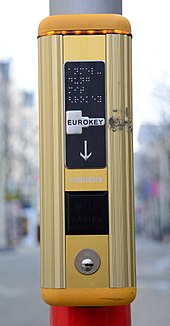| This article needs additional citations for verification. Please help improve this article by adding citations to reliable sources. Unsourced material may be challenged and removed. Find sources: "Euro key" – news · newspapers · books · scholar · JSTOR (June 2023) (Learn how and when to remove this message) |

Euro key (German: Euroschlüssel) is a locking system which enables people with physical disabilities to access facilities free of charge: for example disabled-accessible elevators and ramps, public toilets on motorways, at train stations, in pedestrian zones, shopping centers, museums, public authorities etc. It was introduced in 1986 by the CBF Darmstadt (Club Behinderter und Freunde) in Darmstadt and environs.

The Euro key is now widely used throughout the following European countries: Austria, Bulgaria, Czechia, Denmark, Finland, France, Germany, Italy, Liechtenstein, Norway, Portugal, Romania, Slovakia, Spain, Sweden, and Switzerland, The total numbers of Euro key locks are over 100,000 in Europe; about 350 in the US; about 50 in Turkey.

References
External links
| Disability | |||||||||||
|---|---|---|---|---|---|---|---|---|---|---|---|
| Main topics | |||||||||||
| Approaches | |||||||||||
| Rights, law, support |
| ||||||||||
| Structural and assistive | |||||||||||
| Social issues | |||||||||||
| Disability studies | |||||||||||
| Arts, media, culture, sport | |||||||||||